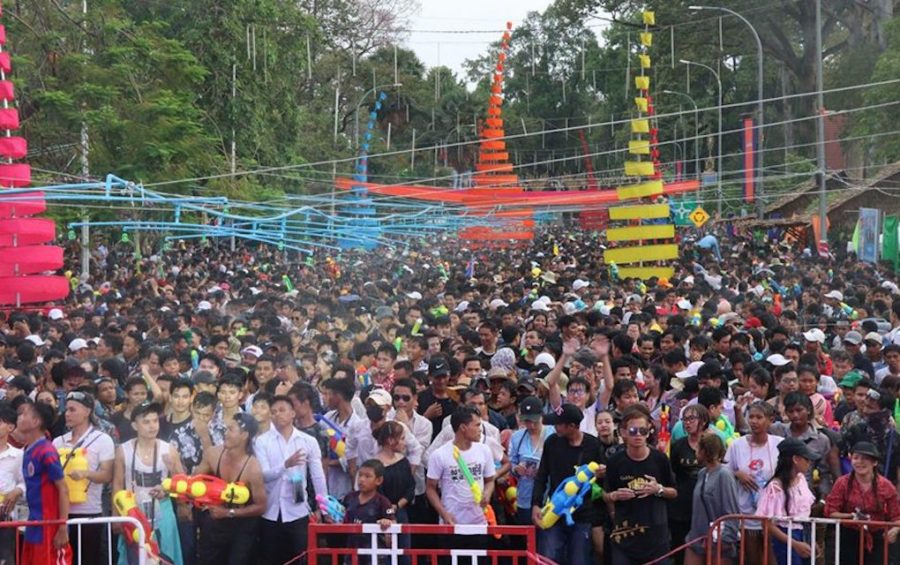While the government has not reported a new Covid-19 case in three days, the global pandemic promises to alter traditional Khmer New Year festivities next week, with religious and most public gatherings banned and police tasked with preventing large assemblies of people.
National Police chief Neth Savoeun issued a slate of measures on Friday in an effort to limit the spread of Covid-19 as millions of Cambodians typically travel to visit family and friends during Khmer New Year, which begins next Monday.
The guidelines allow families to celebrate the national holiday but ban large gatherings, stating that authorities will use police force to suppress dancing crowds, community parties and gatherings at pagodas or other religious sites, according to a police statement.
On Sunday, the Health Ministry directed bus and van drivers to take precautions ahead of the holiday. The ministry didn’t limit passenger counts in vehicles — which are commonly overloaded with people and belongings — but it suggested that drivers leave vehicle windows open rather than rely on air conditioning, encourage passengers to wear face masks and provide them with alcohol-based hand sanitizer or wipes.
National Police spokesman Chhay Kim Khoeun said on Monday that there wasn’t an official limit to the number of people allowed to meet in a group, but he suggested a gathering should not include more than 10 people.
Kim Khoeun said he was especially concerned that recently returned migrant workers might disrespect the guidelines. Since March 20, more than 60,000 workers returned as Cambodia and neighboring countries restricted travel across borders, with more than 50,000 coming back from Thailand, the spokesman said.
“While having some money in hand during the New Year, migrants might hold family parties and call their neighbors to join. So, their parties will become more than 10 guests,” Kim Khoeun said. “We do not hold prejudice against them but we are worried.”
When asked whether people would be arrested for refusing to follow the recommendations, Kim Khoeun said it would depend on whether the government deems it necessary to implement the state of emergency law, which has not yet been approved by the government and signed into law.
“If the government put the country in a state of emergency, it will be another matter,” he said.
Health Ministry spokeswoman Or Vandine said on Sunday that while two days had passed without a new positive case announced, showing the “effectiveness” of government interventions, the nation needed to remain vigilant since “the situation is still fragile” and a second wave of the virus could still occur.
“If we don’t pay attention, this enemy will attack us again within a short time,” Vandine said in a message to reporters.
The ministry reported no new cases of Covid-19 as of Monday morning, leaving the total number of confirmed cases since January at 114. More than 50 people have recovered from the respiratory disease. No deaths linked to Covid-19 have been reported in Cambodia.
Globally, the novel coronavirus has infected 1.2 million people in about 200 countries, with 270,000 recoveries, and been tied to some 70,000 deaths.
Last month, the government ordered closed schools, cinemas, casinos, beer gardens and karaoke venues, or KTVs, and banned religious gatherings and concerts, in addition to preemptively canceling Angkor Sangkran, the annual Khmer New Year festival in Siem Reap.
Though no cases have been found in Takeo province, officials and villagers last month told VOD that they were taking precautions to limit the spread of Covid-19.
In the province’s Koh Andet district, Un Marath, a garment worker who was suspended from her job in Phnom Penh for the month of April because the factory lacked raw materials, said she usually helps her commune, Krapom Chhouk, organize a ceremony held on the festival’s third day.
During the ritual, younger people prepare food and gifts for their elderly relatives and neighbors and wash them with perfumed water as a sign of love, respect and gratitude. This year, Marath, 36, said she and the organizers had to cancel the ceremony, adding that she would respect the ban on large gatherings, but was still disappointed to miss out on the tradition.
“It is very fun to hold the gathering, but if we were to defy [the ban], I would worry that we would have problems too because there will be newcomers and we would not know whether they have Covid-19 or not,” she said.













